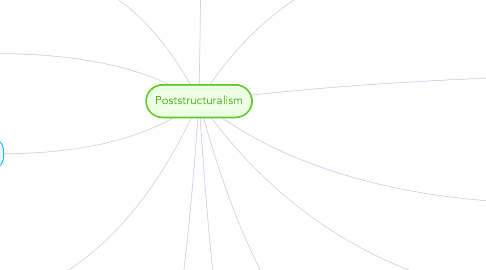Poststructuralism
Door Mariana Rodriguez


1. Anti-foundationalism
1.1. No absolute knowledge
1.1.1. It is
1.2. Its all about representation
1.3. Only perspectives, not abstraction
1.4. Meaning is never fixed
1.5. Rejection of reason as a dogmatic representation
1.6. More than one possibilities
1.7. Knowledge is power
2. Visual imaginary
2.1. Creates, promotes an specific perception
2.2. Discourse formation
2.3. Representation from the point of view of the photographer
2.4. We know things as they are presented in the media
2.5. Within the discourse somethings are discriminated and excluded
2.6. Reduction of reality to a single image
3. Totalizing narratives as normal and natural
3.1. Contextualized
3.2. Aspiration to be a hegemonic narrative
3.3. Nothing is fixed, natural or timeless
4. Ethical and political purpose
4.1. Things can be different
4.2. Repolicizing the dominant
5. Postmodernism
5.1. Cultural forms inspired by the conditions of accelerated time and space and hyper.consumerism in the globalized era.
5.1.1. Po
5.2. Poststructuralism is an interpretative analysis of postmodernism.
6. Power
6.1. Repressive and productive because of the imposition of limits and constraint
6.2. A thing is by knowing what it is not
6.3. Disciplinary power: discipline to produce
7. Marginal sites
7.1. Where certainty ends
7.2. Place where contradictions and hegemonic practices are disturbed
7.3. Sites of struggle
7.3.1. Identity is never sure
7.3.2. Meaning is in doubt
7.3.3. Process of building
7.3.4. Potential with the lack of fixity

